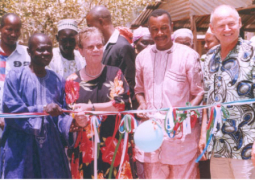A one-day national validation forum on the charter for food crises prevention and management in the Sahel and West Africa recently wrapped up on Friday, at the Baobab Holiday Resort in Bijilo.
The one-day forum was organised by ECOWAS, in collaboration with CILSS, RPCA, SWAC, OECD, and The Gambia government.
In his opening remarks, Abdourahaman Jobe, the Permanent Secretary at the Ministry of Agriculture said after 20 years of existence and evaluation of the draft, it has been deemed necessary to review it in view of the current changing circumstance, such as climate change through participation at the level of donors, civil society and other key stakeholders.
He noted that in view of the moral commitment in ensuring food security, governments in West Africa have given this prominence and placed it high on their agenda. He said at the national level, the issue of food security has become a key development agenda under the leadership of President Yahya Jammeh, by promoting relevant polices and programmes that respond to local food security endeavours.
Mr. Jobe noted that the main aim of the forum was to bring the charter in line with the current food related issues. He said since the issues are being coordinated by SAHEL, West Africa Club, Organisation of Economic Cooperation and Development, among others, the review is being conducted under the aegis of the Economic Community of West African States, and is part of the latter’s regional Agricultural Investment Programme adopted in November 2009, under the West Africa Agricultural Policy, New Partnership for Africa Development framework. This, he added, is geared towards ensuring that The Gambia, like all other CILSS member states, is provided with a sound and efficient structure to enhance good governance in food security.
In his welcome remarks, the Deputy Director and Head of Planning Services, who is also the focal point, Mr. Aba Gibril Sankareh said the aim of the consultative meeting was to bring together organisations dealing with food security issues, so as to bring the charter in line with current and coming realities, as coordinated by SWAC, OECD and the CILSS, under the aegis of the Economic Community of West Africa States (ECOWAS).
He said the purpose of the charter is to foster coordination, policy dialogue and concerted action for food security.
For his part, the Deputy Permanent Security at the Ministry of Agriculture, Abdoulie Danso said the charter was introduce and adopted by the Heads of State and government of the Sahel countries and main donors in 1990 in Guinea Bissau. This, he added, was in response to the impact of the drought of 1970 and 80s. He said over the years, after the introduction of the charter, it was realised that food crises and its associated effects were not only limited to the Sahel countries, but extended to other West African countries.
He said as a result ECOWAS, in collaboration with CILSS and other key stakeholders advocated for the review of the 1st Edition of the charter by ECOWAS member states, plus Chad and Mauritania.
He noted that it is important to note that the food cries is more complex and multifaceted today than the past as populations have grown even doubled in some cases, and free trade generating interdependency in regional markets.
"We realised changes in the economic situation. Thus, the need for a wider range of responses could not be over-sighted," he stated. He noted that as a result, the consultative forum was convened to critically validate the revised charter by civil society group. He said the outcome will be presented at the meeting in the form of a communiqué.



